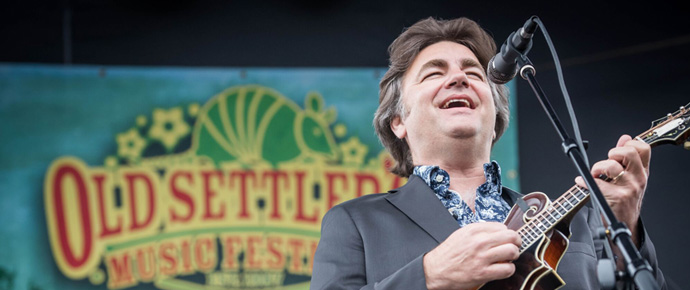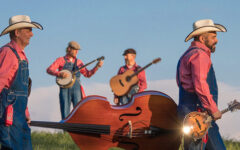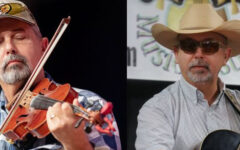
Ronnie McCoury at Old Settler’s Music Festival (April 2017) – photo by Tom Dunning
True to their name, it would seem the Travelin’ McCourys never stand still. So too, given their rich legacy, as bequeathed by their legendary forebear, Del McCoury, it’s also clear that one ensemble simply never seemed enough to contain the wealth of talent and remarkable resources this group of musicians contains.
Comprised of brothers Ronnie McCoury (mandolin) and Rob McCoury (banjo), as well as Jason Carter (fiddle), Cody Kilby (guitar), and Alan Bartram (bass), the band has reaped numerous awards, both individually and collectively. Their 2018 Grammy for Best Bluegrass Album attests to that fact. Ronnie McCoury’s own ranking as the IBMA mandolin player of the year, no less than eight times in fact, Rob McCoury’s standing as IBMA banjo player of the year, and the IBMA wins accrued by Carter and Bartram on their respective instruments reflect that storied stature as well.
Bluegrass Today recently had a chance to speak to Ronnie McCoury just prior to a busy summer touring schedule. He was only too pleased to share the band’s story, both past and present.
You folks always seem to be out on the road doing festivals and what not. Do you ever have any downtime?
We were down basically from December up until March. We were making a new record and we got into the studio a few times and then finished it up. Plus, we were finishing up dad’s record as well, which is pretty much done. But when you’re working with two bands, it takes some figuring out.
Clearly, you guys are in a unique position because essentially you do double duty. Do you you ever get on stage and find yourself start playing a song that belonged in your dad’s set as opposed to your own. We would imagine that could be confusing.
I personally have been performing with my dad since 1981. So to me, those songs are the easy ones. It’s the Travelin’ McCourys songs that we’re still learning. The Travelin’ McCourys are about twelve years old, something like that. So we’re just still learning a lot of new songs. It keeps us busy, especially with two bands, meaning we’re always juggling the schedules.
Obviously, the fact that you’re a family band means the ties run deep. Do those relationships ever get in the way of an objective perspective. We all know how families can be.
I know what you’re saying. I’ve been asked that before.
We’d like to claim some originality in our line of questions, but regardless, brother bands in particular often run into some sticky situations. The Everly Brothers were one example.
Yes, that’s so true. But then, there’s the two different things — with my dad, and of course, with my brother. We’ve just always been at it, ever since we were young. I think the hardest years were probably our teenage up until our early 20s, when you don’t really know who you are. You might think that you know who are, but you still need to find your own path and all that. I went through all that, but I never pursued it much.
By the time we moved to Nashville in ’92, I think it was all okay. I was in my early 20s, and I’m four years older than my brother. When we got to Nashville, all that other stuff kind of went away. We were there right beside my dad and it all just sort of blossomed for him. And he was already 50 or 52, or 53, or something like that. So by the time we got to Nashville, he had this whole other life that happened. He became member of the Grand Ole Opry and had a legendary stature with induction into the various Halls of Fame and this and that, and we were just there with him, and so we were so proud to be a part of it.
And then the time came when my dad was about 70, or maybe a little older, and he said, “You know, guys, I don’t want to quit just yet, but if something would happen to me, or if something happened to my voice, I’d hate for you boys to start just cold. So that kind of helped us get pushed out on our own. I always kind of had that in the back of my mind anyway as something I wanted to do, so I knew it was gonna come eventually. But it was also helpful that he thought of that and thought of us, and so that’s what started this band as the Travelin’ McCourys.
No doubt the family association opened some doors, but given the expectations that people might have based on your dad, did you ever find it intimidating to be more or less following in his footsteps?
Well, I do think about it, because my dad is still going strong. He’s 84 years old. And the next generation below him — folks like Ricky Skaggs and Sam Bush and, and Jerry Douglas and Marty Stuart — look at my dad and think, “If he can do that, I want to do that at that age.” It’s inspiring to them. I see that and I hear that from them. And my dad always says, when his singing is no longer any good, he’s just not going to do it. He’s gonna step aside. So here I am at age 56 thinking the same thing.
Well apparently he’s not ready to quit just yet.
Well, he is such a workhorse and still so strong and influential, he sees no reason to.
So do you feel like you’re carrying on a legacy, even though you’re doing your own thing at the same time? Obviously, your band is distinctive from your dad’s band, but they do have some specific connections of course.
I feel that a thousand percent, I truly do. I raise my dad up as high as I can, and I always will. Plus, I gotta follow in his footsteps and I always appreciate that fact. I just try to do my best. My dad has always given a hundred percent on stage. It makes you want to do the same thing.
So clearly you consider him your role model. But then again, you’ve achieved so much on your own with all the awards you’ve won. It’s amazing, but it’s not really amazing, because you deserve it. Still, with all the accolades that you guys have won, and all the awards, and honors, and achievements, do you see that you’ve set a high bar for yourself as well? And is there an obligation to live up to that high bar, particularly when you start a new project or something of that sort?
Well, there has to be. I have my heroes besides my father. Plus, when you’re playing bluegrass music, you don’t really rely on electronics. You rely only on yourself and your instrument and your voice, or whatever, so you have to be on your game. I have been fortunate enough to have been been nominated for those awards and recognized by my peers, so it does just kind of make you think that you can’t let anybody down.
That would also seem to be some added pressure.
Yeah, that’s what I’m getting at. But at the same time, you can’t let it get to you. The one thing that I can take away from my dad is that he has never changed who he is. And I’ve had guys tell me that, from the day that I was born. They say, that guy’s still the same guy. So I take that and I think well, why do I need to be different from that? You just got to be yourself. I grew up in the ’70s, but the ’80s were my teenage years. So, like everybody else, I was listening to other music. And that’s more about what we do with the Travelin’ McCourys, taking not only what I’ve learned from my dad with the music that he’s passed down, but also the stuff that kind of influenced me. The Allman Brothers were huge in our house. As teenagers, we played music that’s not too far from what we do now.
Indeed, the whole image of bluegrass and roots music has evolved and changed. People used to have this notion that it was simply old timey music, but now, it’s acquired a populist appeal. It becomes a cause for celebration and a festival following as well.
The guy that’s kind of carrying this torch now, is Billy Strings.
A lot of folks say the same thing.
I met the guy when he was, I guess, around 20. I think he’s about 30 now. He made his way to Nashville and was just picking around town, and the next thing you know, after the pandemic, he just sort of exploded. I’m sure everybody’s mentioning him because he is kicking that door open. There’s always somebody who does it in every generation and he’s the guy right now.
In the last ten or fifteen years, bluegrass has managed to make its way into the mainstream. Do you feel that way?
Yeah, but it’s always hard for me to figure out because I’ve just been this guy who’s doing it. I’ve been playing with my dad just about all my life, and the big thing that I saw, and my dad saw in the ’70s, was when the movie Deliverance became so big. And that kind of opened the door, in a way. But so too, festivals just began to blossom in the 70s. And then the college circuit, the colleges, were so open to having bluegrass music. Then it was O Brother, Where Art Thou, and that kind of kicked the door open as well.
And we were part of that door. We went all across the country, and playing all the big places. We were there in the middle of it. It was so big back then. Man of Constant Sorrow was such a big song. People were like, “What is this music all about?” So now their kids, who grew up hearing, kind of dig this whole new thing, which to them is new anyhow. I think that people really appreciate the musicianship. It’s not easy to do. And like I said before, you’re not hiding behind anything electronic.
It seems that the songs and the emotions they express really hit home for a lot of people. It’s something that people can relate to.
Plus, it’s a communal thing. During the festivals, people tend to gather around a campfire and play their instruments with impromptu jams and such. It lends a feeling of community. I think it’s something that’s part of every generation. It’s just that you’ve got to find it. Nevertheless, it happens every time.
You’re being modest, Ronnie. You and your band and your dad’s bands have helped people find it. You’ve been part of that whole resurgence, part of the wave of artists and ensembles that have brought the music to the forefront.
Thank you, I appreciate it. We just always kind of have been known for doing the same thing our entire lives. You don’t always know how it affects people, but it is amazing though. We have gotten messages to that effect through the years. My dad has gotten many, many messages where people say his music has changed their lives.







